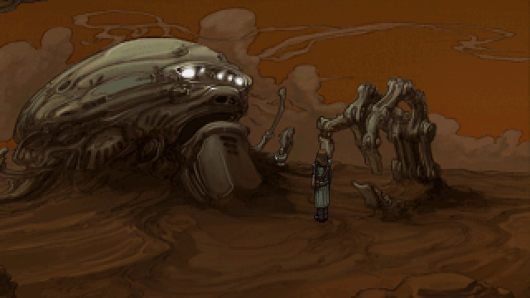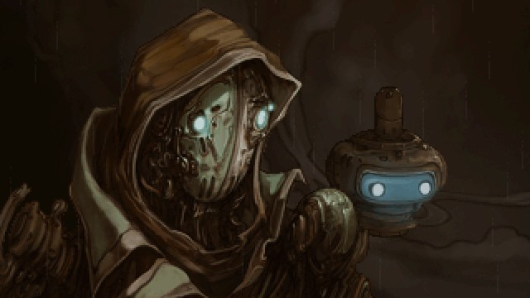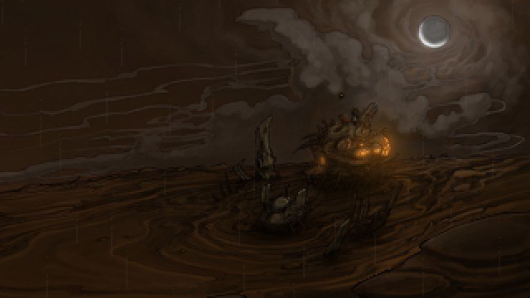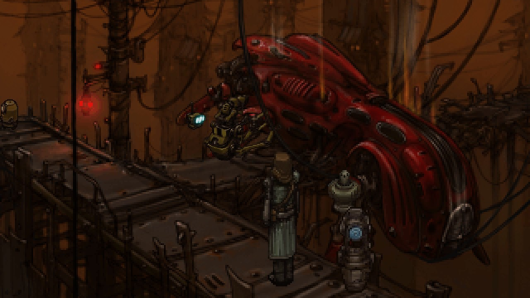Primordia Cant Talk to Oswald Again
Equally a grassroots publisher, Wadjet Eye Games have proven themselves to have an eye for contained talent that's second to none, particularly in the realm of scientific discipline fiction. Subsequently helping become Joshua Nuernberger'due south incredible Gemini Rue and Vince Twelve's brilliant Resonance completed, Wadjet Eye turned its attention to Wormwood Studios, a three-man team with years of private industry feel who have joined together to nowadays a atypical vision of a postal service-human globe. The result is some other aureate egg (albeit a very brown golden egg) of sci-fi adventuring in the form of Primordia.
A 2D bespeak-and-click chance in the classical mode, Primordia follows the quest of i Horatio Nullbuilt v5—an android—and his floating companion Crispin Horatiobuilt v1—also a machine. Indeed, there are no traces of people on the planet, only a self-propagating race of robots, some of whom worship the ancient, legendary creator of robotkind, Human. Horatio is one such Humanist, believing that Man left robots as shepherds to watch over the planet they left backside. But what a blindside-up job they've done. The world Horatio and Crispin inhabit is the very definition of a wasteland: sand dunes stretch into infinity, dotted with the scattered wreckage of crashed ships, disabled robots, and the ruins of war-torn cities.
Every bit we run across our heroes, they are living semi-hermetic lives out in the desert, attempting to repair their ship, the severely-damaged UNNIIC, with but the eerie radio broadcasts out of Metropol—a seemingly robo-communist utopia—to keep them company. Before long, they are attacked by an unknown monolithic, laser-equipped robot who blasts his way into the ship and forcibly steals their coveted and rare power core. Stranded without power, Horatio and Crispin must set out to recover their stolen property, or at the very least supplant it.

These simple beginnings slowly mutate into a much more involved tale of utopian ethics, political upheaval, and religious oppression once you lot eventually and (unsurprisingly) head to Metropol, a troubled city that has undergone some serious regime changes in the recent past. Somewhen, Horatio's quest for his stolen power cadre volition plunge him deep into Metropol's messy political mural and strength him to take sides in a conflict he'd rather have cypher to exercise with. It takes a while to become at that place, however, and the game tin can seem a little slow up to that point as you spend the offset couple of hours ambling around digging through junk piles, but once it gets going information technology keeps the new characters, places, and ideas coming at a practiced clip.
All of this is told in a visual style that seems to draw from Amanita Pattern'south Machinarium, French comic artist Moebius, and classic scientific discipline fiction such as Dune. Despite the relatively humble nature of the retro pixel art graphics, which are depression resolution and feature little to no animation, Primordia is a visual triumph. The backgrounds drip with atmosphere, with even minor locations total of sweeping lines, gritty details, and muted colors that suggest a strange culture decades, perchance centuries, past annihilation that could have been considered prosperity. Despite existence primarily brown and gray, including the oppressive sky, the backgrounds and characters are detailed, memorable, and varied. Instead of feeling repetitive, the colour palette is leveraged effectively to evoke pathos and decay. Combined with the moody electronic soundtrack that resembles Vangelis'southward classic Blade Runner score—all swelling pads and ethereal ambience—Primordia easily transports y'all to a rich and strange earth.
The atmosphere is so wonderfully dreary that it almost—most—clashes with the relatively lighter tone of the residue of the game. While the story definitely goes to some nighttime places, and at that place is a layer of gloom hanging over nearly every conversation and set slice, much of the game actually seems kind of light-hearted. Horatio may be stoic and gravelly, voiced by Breastwork narrator Logan Cunningham, but Crispin (Abe Goldfarb, Blackwell's Joey Mallone) fulfills every stereotype of the comic relief sidekick, joking and punning his way through about every one of his lines. And many of the characters you'll run into are colorfully goofy, from the posh Oswald, complete with summit hat and monocle, to a bot obsessed with prime numbers and rhyming.

It's not that these lighter moments aren't funny; they're well-written, well-acted, and oft downright charming. But with the foreboding and moody aesthetic that dominates otherwise, it's a little jarring that much of the character interaction hews closer to WALL-E than The Route. To exist articulate, I'm not lament. In fact, after I realized the tone wasn't going to be what I expected, I got used to it, and by the terminate I felt that it had enhanced what might accept been an unrelentingly gloomy experience without it.
Information technology's the richness of the characters that makes the jumps betwixt low-cal-hearted robot comedy and grim mail service-apocalyptic dystopian fiction work. Despite the cast being populated past machines, these are, for the near part, fully fleshed out personalities. Robots may need to recharge instead of eat or slumber, but they accept wants and needs similar any human. They may want justice or freedom, take senses of humor, or feel sadness at the deactivation of another robot. They are all, to some extent, enslaved by their own core logic, whatever that dictates. Horatio tin can't help but eschew societal integration in favor of a life of rugged individualism, however alone. Charity, an assistant to Metropol's sometime legal potency (remember a i-man supreme court), works constantly to button her feelings bated and view the globe but in the black and white impartiality of the law. Even Crispin, who at first might seem like a shallow jokester, has a carefully constructed set of desires.

Other than the aesthetics and story, Primordia is about as traditional a point-and-click adventure as they come up. Hotspots are labeled as you hover over them; left-clicking interacts, correct-clicking examines. Yous store items in your inventory, where they tin be combined or used in the surroundings. You tin interact with Crispin at any time, either by using his inventory icon on hotspots or using items on him, often when there is something that only he can attain with his maglev hover ability. You can also talk to him to receive a tiny hint, which is usually no more than than a nudge in the right direction. Horatio keeps a datapouch that automatically stores important notes such as codes and key conversation points, as well equally a map that allows you to spring between main locations instantly. Yous'll love having that ability when moving betwixt bombed-out train stations, junkyards one-half-cached in sand, and crumbling towers that comprise so much of Primordia's decayed world.
In terms of gameplay, at that place'south very niggling here that will surprise anyone who's ever played an take chances game. You'll scour environments for useful items, get together clues from conversations, and effigy out lots and lots of keycodes. I'd wager that a good 2/iii of the puzzles in this game involve doors locked by codes that must be deciphered, constructed from diverse clues, or extracted from NPCs. To go those codes, you'll run the gamut of standard adventure obstacles, combining items into new gadgets, navigating conversation copse, dealing with logic puzzles and even doing some light math. The game is reasonably challenging without being frustrating, and puzzles include plenty of feedback and signposting to guide you to the right solution instead of leaving you in the nighttime. And so all in all, very well done, if a footling on the safe side.
Many of the puzzles have multiple solutions, but these branching solutions are so subtly woven into the game that I rarely realized a choice was available. Primordia is not the type of game that smacks you over the head and says, "You tin can become through the sewers or y'all can convince somebody to open up the door." Most of the time it just seemed like I was discovering the solution that made the virtually sense, without e'er knowing in that location were other options. But then, isn't that the way it should exist?

Decision-making doesn't simply stop at puzzles. For a game that heavily features the theme of gratuitous volition, it makes sense that it would involve a number of player choices that influence the issue. Some of these are obvious—nearly the terminate you'll have a number of choices that directly touch on which of the x(!) endings you'll get. But some are not so obvious. In fact, I was making choices throughout the game that I didn't fifty-fifty realize were choices. The way ane deals with a item religious zealot early on, for example, can slightly impact 1 of the existing endings. The effects are small but it does add together a layer of replay value and reinforces the game's concepts. And because the game is roughly vii-x hours long the first fourth dimension through, there's already quite a bit of content to brainstorm with.
If Primordia had been released in the '90s, in that location'southward a good chance we would be talking near it with the same reverence as pocket-size classics like Snatcher or Beneath A Steel Sky. I have very little to really criticize about the game—information technology's a uniquely gorgeous sci-fi game with style to spare, a plot that veers successfully between goofy humor and suitable solemnity, and puzzles with multiple solutions that feel like logical extensions of the state of affairs. It's only in more subtle ways that it falls a lilliputian short of the genre masterpieces. It has lofty goals, exploring profound themes such as collectivism vs. individualism, free will vs. conditioning, religious faith vs. pure logic, but it doesn't seem to reach the depths of its potential. The puzzles are satisfying but none are outstandingly clever, the characters are likeable without existence truly unforgettable, so on.
None of this is a knock on what Wormwood Studios has achieved, even so, as every role of the game screams of the passion and talent of its developers. Similar other indie designers Wadjet Eye has taken under wing, this team has proven itself a studio to watch. For their starting time outing, Primordia is already a bang-up game, and I look forward to seeing more from them in future.
WHERE Tin can I DOWNLOAD Primordia
Primordia is available at:
We get a minor commission from whatever game you buy through these links (except Steam).
Source: https://adventuregamers.com/articles/view/23408
Post a Comment for "Primordia Cant Talk to Oswald Again"